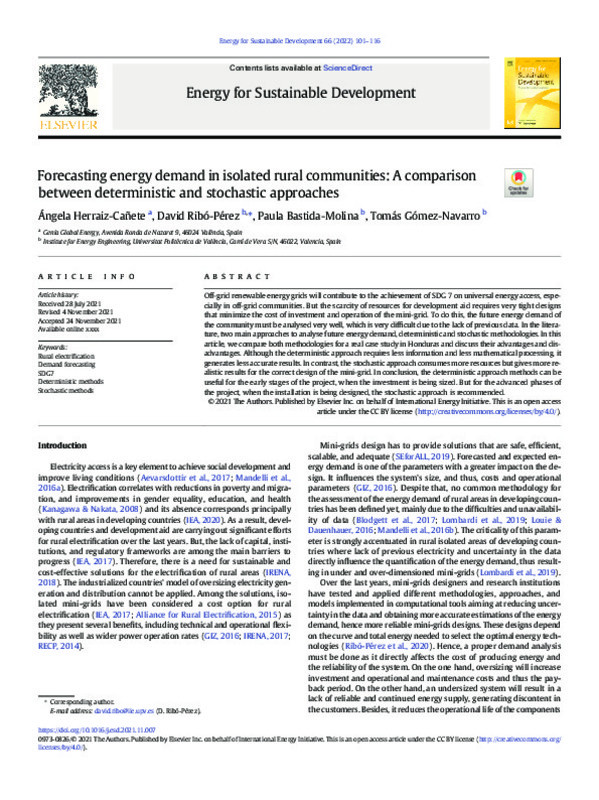JavaScript is disabled for your browser. Some features of this site may not work without it.
Buscar en RiuNet
Listar
Mi cuenta
Estadísticas
Ayuda RiuNet
Admin. UPV
Forecasting energy demand in isolated rural communities: A comparison between deterministic and stochastic approaches
Mostrar el registro sencillo del ítem
Ficheros en el ítem
| dc.contributor.author | Herraiz-Cañete, Ángela
|
es_ES |
| dc.contributor.author | Ribó-Pérez, David Gabriel
|
es_ES |
| dc.contributor.author | Bastida-Molina, Paula
|
es_ES |
| dc.contributor.author | Gómez-Navarro, Tomás
|
es_ES |
| dc.date.accessioned | 2022-02-14T19:02:51Z | |
| dc.date.available | 2022-02-14T19:02:51Z | |
| dc.date.issued | 2022-02 | es_ES |
| dc.identifier.uri | http://hdl.handle.net/10251/180804 | |
| dc.description.abstract | [EN] Off-grid renewable energy grids will contribute to the achievement of SDG 7 on universal energy access, especially in off-grid communities. But the scarcity of resources for development aid requires very tight designs that minimise the cost of investment and operation of the mini-grid. To do this, the future energy demand of the community must be analysed very well, which is very difficult due to the lack of previous data. In the literature, two main approaches to analyse future energy demand, deterministic and stochastic methodologies. In this article, we compare both methodologies for a real case study in Honduras and discuss their advantages and disadvantages. Although the deterministic approach requires less information and less mathematical processing, it generates less accurate results. In contrast, the stochastic approach consumes more resources but gives more realistic results for the correct design of the mini-grid. In conclusion, the deterministic approach methods can be useful for the early stages of the project, when the investment is being sized. But for the advanced phases of the project, when the installation is being designed, the stochastic approach is recommended. | es_ES |
| dc.description.sponsorship | This work was supported in part by the Spanish public administration under the grant FPU2016/00962, by the regional public administration of Valencia under the grant ACIF/2018/106, by the Food and Agriculture Organisation under the Letter of Agreement (PO number: 332412). And finally, by the Cátedra de Transición Energética Urbana (Las Naves-FVCiE-UPV) | es_ES |
| dc.language | Inglés | es_ES |
| dc.publisher | Elsevier | es_ES |
| dc.relation.ispartof | Energy for Sustainable Development | es_ES |
| dc.rights | Reconocimiento (by) | es_ES |
| dc.subject | Rural electrification | es_ES |
| dc.subject | Demand forecasting | es_ES |
| dc.subject | SDG7 | es_ES |
| dc.subject | Deterministic methods | es_ES |
| dc.subject | Stochastic methods | es_ES |
| dc.subject.classification | INGENIERIA ELECTRICA | es_ES |
| dc.subject.classification | PROYECTOS DE INGENIERIA | es_ES |
| dc.title | Forecasting energy demand in isolated rural communities: A comparison between deterministic and stochastic approaches | es_ES |
| dc.type | Artículo | es_ES |
| dc.identifier.doi | 10.1016/j.esd.2021.11.007 | es_ES |
| dc.relation.projectID | info:eu-repo/grantAgreement/MECD//FPU16%2F00962/ES/FPU16%2F00962/ | es_ES |
| dc.relation.projectID | info:eu-repo/grantAgreement/FAO//332412/ | es_ES |
| dc.relation.projectID | info:eu-repo/grantAgreement/Food and Agriculture Organisation//20180267//Design of a hybrid renewable microgrid system within the Climate Resilient Rural Communitites project that will be developed in the rural community El Santuario in the Department of Choluteca, Honduras/ | es_ES |
| dc.relation.projectID | info:eu-repo/grantAgreement/GENERALITAT VALENCIANA//ACIF%2F2018%2F106//AYUDA PREDOCTORAL GVA-BASTIDA MOLINA/ | es_ES |
| dc.relation.projectID | info:eu-repo/grantAgreement/AECID//2019_ACDE_000842//Microred Inteligente Híbrida de Energías Renovables para solucionar el Trilema Agua-Alimentación-Energía en una comunidad rural de Honduras / | es_ES |
| dc.relation.projectID | info:eu-repo/grantAgreement/AECID//2020%2FACDE%2F000306//MICRORED INTELIGENTE HIBRIDA DE ENERGIAS RENOVABLES PARA SOLUCIONAR EL TRILEMA AGUA-ALIMENTACION-ENERGIA EN UNA COMUNIDAD RURAL DE HONDURAS/ | es_ES |
| dc.rights.accessRights | Abierto | es_ES |
| dc.contributor.affiliation | Universitat Politècnica de València. Departamento de Proyectos de Ingeniería - Departament de Projectes d'Enginyeria | es_ES |
| dc.contributor.affiliation | Universitat Politècnica de València. Departamento de Ingeniería Eléctrica - Departament d'Enginyeria Elèctrica | es_ES |
| dc.description.bibliographicCitation | Herraiz-Cañete, Á.; Ribó-Pérez, DG.; Bastida-Molina, P.; Gómez-Navarro, T. (2022). Forecasting energy demand in isolated rural communities: A comparison between deterministic and stochastic approaches. Energy for Sustainable Development. 66:101-116. https://doi.org/10.1016/j.esd.2021.11.007 | es_ES |
| dc.description.accrualMethod | S | es_ES |
| dc.relation.publisherversion | https://doi.org/10.1016/j.esd.2021.11.007 | es_ES |
| dc.description.upvformatpinicio | 101 | es_ES |
| dc.description.upvformatpfin | 116 | es_ES |
| dc.type.version | info:eu-repo/semantics/publishedVersion | es_ES |
| dc.description.volume | 66 | es_ES |
| dc.identifier.eissn | 0973-0826 | es_ES |
| dc.relation.pasarela | S\451204 | es_ES |
| dc.contributor.funder | GENERALITAT VALENCIANA | es_ES |
| dc.contributor.funder | MINISTERIO DE EDUCACION | es_ES |
| dc.contributor.funder | Food and Agriculture Organisation | es_ES |
| dc.contributor.funder | AGENCIA ESPAÑOLA DE COOPERACION INTERNACIONAL | es_ES |
| dc.contributor.funder | FOOD AND AGRICULTURE ORGANIZATION OF THE UNITED NATIONS | es_ES |
| dc.subject.ods | 01.- Erradicar la pobreza en todas sus formas en todo el mundo | es_ES |
| dc.subject.ods | 07.- Asegurar el acceso a energías asequibles, fiables, sostenibles y modernas para todos | es_ES |
| dc.subject.ods | 13.- Tomar medidas urgentes para combatir el cambio climático y sus efectos | es_ES |








